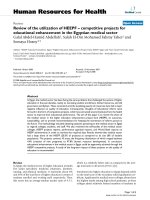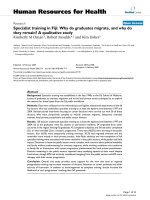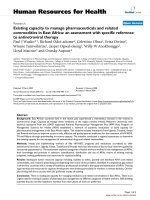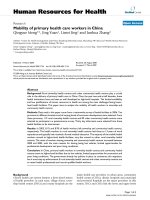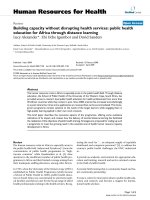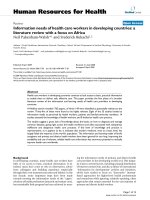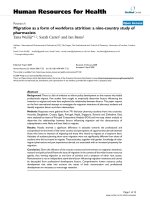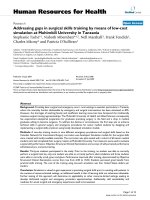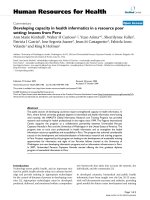báo cáo sinh học:" Building capacity in health facility management: guiding principles for skills transfer in Liberia" pptx
Bạn đang xem bản rút gọn của tài liệu. Xem và tải ngay bản đầy đủ của tài liệu tại đây (254.7 KB, 7 trang )
RESEARC H Open Access
Building capacity in health facility management:
guiding principles for skills transfer in Liberia
Laura A Rowe
1
, Sister Barbara Brillant
2
, Emily Cleveland
3
, Bernice T Dahn
4
, Shoba Ramanadhan
1
, Mae Podesta
3
,
Elizabeth H Bradley
1*
Abstract
Background: Management training is fundamental to developing human resources for health. Particularly as
Liberia revives its health delivery system, facility and county health team managers are central to progress.
Nevertheless, such management skills are rarely prioritized in health training, and sustained capacity building in this
area is limited. We describe a health management delivery program in which a north and south institution
collaborated to integrate classroom and field-based training in health management and to transfer the capacity for
sustained management development in Liberia.
Methods: We developed and implemented a 6-month training program in health management skills (i.e. strategic
problem solving, financial management, human resource management and leadership) delivered by Yale University
and Mother Patern College from Liberia, with support from the Clinton HIV/AIDS Initiative. Over three 6-month
cycles, responsibility for course instruction was transferred from the north institution to the south institution. A self-
administered survey was conducted of all participants compl eting the course to measure changes in self-rated
management skills, the degree to which the course was helpful and met its stated objectives, and faculty
members’ responsiveness to participant needs as the transfer process occurred.
Results: Respondents (n = 93, response rate 95.9%) reported substantial improvement in self-reported
management skills, and rated the helpfulness of the course and the degree to which the course met its objectives
highly. Levels of improvement and course ratings were similar over the three cohorts as the course was transferred
to the south institution. We suggest a framework of five elements for implementing successful management
training programs that can be transferred and sustained in resource-limited settings, including: 1) use a short-
course format focusing on four key skill areas with practical tools; 2) include didactic training, on-site projects, and
on-site mentoring; 3) collaborate with an in-country academic institution, willing and able to scale-up and maintain
the training; 4) provide training for the in-country academic faculty; and 5) secure Ministry-level sup port to ensure
participation.
Conclusion: Our findings demonstrate key elements for scaling up and replicating educational initiatives that
address management skills essential for long-term health systems strengthening in resource-poor settings.
Background
Strengthening health systems, particularly health care
delivery systems, is an international priority, as illus-
trated by extensive efforts to support and develop sys-
tem improvements by the World Health Organization
(WHO), the World Bank, major bilateral donors such as
the Department for International Development (DFID)
in the United Kingdom, and large pr ivate donors.
Although much attention has been given to enhancing
clinical and public health skills, less focus has been
directed at developing management and leadership skills
needed to stre ngthen health systems [1-4]. Adequate
attention to such foundational s kills is critical in order
to enable large-scale, sustainable change in health care
delivery in resource-limited settings.
Management skills have had a positi ve impact on
health systems strengthening and process-related out-
comes in a number of settings, including projects in
Ethiopia, the Gambia, Ghana, Mozamb ique, Nicaragua
* Correspondence:
1
Yale School of Public Health, New Haven, CT, USA
Rowe et al. Human Resources for Health 2010, 8:5
/>© 2010 Rowe et al; licensee BioMed Central Ltd. This is an Open Acc ess article distributed under the terms of the Creative Commons
Attribution License (http://creativecom mons.org/licenses/by/2.0), which permits unrestricted use, distr ibution, and reproduction in
any medium , provided the original work is properly cited.
and the United Republic of Ta nzania [1-3,5-8]. These
projects have demonstrated the importance of equipping
managers with specific skills in priority-setting, pro-
blem-solving, and change management, and have
demonstrated improvements in supervision, teamwork,
planning and coordination [1-3,5,6], delivery of essential
health services [3,6], and management of health
resources [5,7,8]. Despite the consistency of these find-
ings, however, evidence on the long-term sustainability
and the institutionalization of such management tools is
limited.
In this paper, we describe a health management capa-
city b uilding program, which sought to: a) develop key
management skills for County Health Teams (CHT) and
health facility managers throughout Liberia, and b)
transfer the capacity for sustained health management
training to the country level. We examine a set of gui d-
ing principles that promotes the systematic transfer of
management skills to both course participants and
faculty members to ensure scalability and sustainability
of the transferred skills.
Launched in 2007 at the request of the Mother Patern
College of Health Sciences in Monrovia and endorsed
by the Liberian Ministry of Heath and Social Welfare
(MoHSW), the program was a unique partnership
between the Clinton Foundation HIV/AIDS Initiative
(CHAI), the Mother Patern College of Health Sciences/
Stella Maris Polytechnic, and the Yale School of Public
Health to strengthen management skills of key leaders
in health facilities and county health teams in Liberia.
We used the experience of this program to propose a
set of key elements needed for programs to scale up,
replicate and sustain training initiatives that enhance
foundational management skills critical to providing
long-term strengthening of health systems in low-
income countries.
Methods
Setting
In 2007, af ter 14 years of civil war, Liberia began the
process of rebuilding its health delivery system through
a decentralized health care sector. As part of the
rebuilding, the MoHSW developed a Basic Package of
Health Services (BPHS) guaranteed to all Liberians
accessing services through the public sector. Through
the BPHS, health facility standards were refined and
introduced at each level of care, catapulting Liberia into
an environment of health facility reform. In order to
meet these standards, the MoHSW focused on enhan-
cing the management capacity of health centers, clinics,
and hospitals throughout the country. In addition to
these higher standards, County Health Teams (CHTs) -
consisting of district health workers often with limited
background or experience in management - became
responsible for decision-making and priority-setting at
local levels.
During this time of rebuilding and decentralization,
Liberia was and is transitioning from a period of relief
to one of development. With this transition have come
changes in partner and donor support and an adj ust-
ment from crisis management to strategic thinking and
systems development. Together, these contextual issues
magnify the need fo r strong ma nagement skills at the
CHT and health care organizational levels.
Intervention
Within this setting of decentralization and he alth sector
reform, a classroom-based Health Systems Management
Course for health facility and CHT managers was devel-
oped and taught by Yale University, Mother Patern Col-
lege, and CHAI. Follow-up and mentoring for course
part icipants was provided by Mother Patern faculty, on-
site Yale-Clinton Foundation Fellows, and CHAI staff
who assisted participants in managing projects and in
reinforcing course concepts. The Health Systems Man-
agement Course is a competency-based training course
focused on the core skills of health care management,
includi ng scienti fic problem solving and strategic think-
ing, human resource management, financial manage-
ment, and leadership development. The content of the
course was designed to teach participants how to think
strategically in several key domains and then how to use
the more conceptual tools to solve concrete problems,
including t he implementation of the Basic Package of
Health Services and related policies. A core component
of the training was to link classroom didactics to field-
based applications, where teams were expected to use
the management skills developed and apply them to
specific expectations for MoHSW policy implementa-
tion. For example, problem statements were generated
around expected deliverables outlined in the six focus
areas of the Basic Package of Health Services (e.g.
maternal and infant health, child health, reproductive
and adolescent health, communicative disease control,
mental health and emergency care) such as establishing
regular supportive supervision in primary health care
units, ensuring effective management of malaria, and
establishing an effective county referral system.
Course part icipants included two to four managerial
representatives from CHTs, the MoHSW, government
hospitals, and Liberians working with international non-
governmental organizations (INGOs) in the oversight of
multiple health facilities. Participants were nominated to
apply and selected based on successful completion of a
course application, which included holding a supervisory
or management position within a CHT, government
institution, INGO or faith based organization; answering
four short questions in a clear manner; and coming
Rowe et al. Human Resources for Health 2010, 8:5
/>Page 2 of 7
recommended by the head of one’ s organization or
CHT.
Consistent with the go al of building capacity at
Mother Patern College and transitioning the course
from Yale to Liberian faculty, the course was conducted
in a stepped approach with increasing responsibility
transferred to Mother Patern i nstructors with each
training cycle. Each cycle comprised three classroom
periods lasting approximately 10 days each, which took
place over a period of five months. In the first cycle,
Yale University instructors developed and taught 100%
of the material. In the second cycle, after substantial
train-the-trainer sessions, instructors from Mother
Patern College conducted 50% of the training with Yale
facilitators conducti ng the remaining 50% in addition to
providing s upervision and feedback. In the third cycle,
Mother Patern College took on 100% of course instruc-
tion, with Yale providing only back-up support. By the
fourth cycle, Mother Patern instructors will teach and
manage 100% of the material without Yale or CHAI
support. The full transfer (the first three cycles or
cohorts where Yale and CHAI were present) required
approximately 2 years to complete.
In addition to classroom training, the course requi red
substantial field-based work with supervision. Between
the 10-day classroom periods, participants returned to
their counties and/or health facilities to apply course
skills and tools in their work settings, and to complete
field-based project assignments including the use of root
cause analysis balanced scorecards and comparative ana-
lysis in order to support efficient problem solving
approaches. During this time, participants received on-
the-gro und mentoring in management skills and quality
improvement approaches, as they applied classroom
learning to their real-world w ork s ituations. Mentoring
was provided b y Mother Patern faculty, CHAI, the
MoHSW, and five Yale-CHAI Fellows placed in two
Monrovia h ospitals and on a rotational basis in CHTs
throughout Liberia.
Since the completion of the program, staff originally
trained through the train-the-trainer mechanism have
identified and trained additional individuals. The origi-
nal cohorts of trainees are now conducting trainings
themselves t argeting middle-level staff in counties
including clinical officers-in-charge, supervisors and
coordinators. The o riginal management course material
has been used to prepare these subsequent trainings. In
the 6 months following the final cohort reported in this
paper, graduates of the original program have trained 27
additional staff from two counties, with plans to expand
to three more counties in the next 6 months. In addi-
tion, the Liberian academic partner, Mother Patern Col-
lege, is currently working from the original materials to
mentor the MoHSW in devel oping its own management
and leadership program. Through interviews and an
on-the-ground assessment, Mother Patern College man-
agement staff members are conducting a program
evaluation in order to measure the course’s impact and
identify areas for improvement, as needs and content
continually evolve i n the Liberian context. These efforts
refl ect the transfe r of the program beyond the first gen-
eration of trainees and underscore the degree to which
both country-level and Ministry-level staff continue to
integrate the material into their positions.
Data collection and measures
We conducted a self-administered survey of all partici-
pants completing the course at the end of each session
to measure change in key indicators as the transfer
process occurred (cohort 1 was taught 100% by Yale,
cohort 2 was taught 50% by Yale and 50% by Mother
Patern College, and cohort 3 was taught 100% by
Mother Patern College). Indicators included self-rated
management skills (before and after the course), course
evaluations, and faculty members’ responsiveness to par-
ticipant needs and ability to teach and manage the train-
ing. Participants rated each indicator on a scale, with
possible responses tailored to the survey item. For
respondents’ self-rated management skills, response
categories were: very strong and confident, strong, mod-
erate, weak, and very wea k. For cour se evaluations, the
response categories were: extremely well, well, a little,
not at all, no opinion. For faculty members’ ability to
teach and manage the course e ffectively, response cate-
gories were: yes, definitely; yes, somewhat; no; not at all;
and no opinion. Evaluations were designed by the
research team and took approximately 30 minutes to
complete (see Additional File 1).
Data analysis
We utilized data from surveys administered in the final
session for each cohort. We used standard descriptive
statistics to characterize item responses, stratified by
cohort. We evaluated differences between cohorts for
the items of interest using Fisher’s exact tests. We calcu-
lated 95% confidence intervals around proportions using
Wilson’s method, including a continuity correction [9].
Analyses were c onducted using SAS version 9.1 (SAS
Institute, SAS. 2003: Cary, NC.).
Results
Study participants
Between June 2007 and January 2009, we trained 97 par-
ticipants, representing all 15 counties in Liberia, the
National AIDS Control Program, two hospitals, the
MoHSW and four INGOs. A total of 93 participants
completed surveys, yielding a response rate of 95.9%.
The first training cohort (June 2007 - October 2007)
Rowe et al. Human Resources for Health 2010, 8:5
/>Page 3 of 7
consisted of 36 participants representing 7 counties and
the National AIDS Control Pro gram. The second train-
ing cohort (January 2008 - May 2008) consisted of 32
participants from the remaining 8 counties and 1 gov-
ernment hospital. The third training cohort (October
2008 - January 2009) consisted of 28 participants includ-
ing additional members of 4CHTs,2hospitals,the
MoHSW and 4 INGOs. Each county and/or facility was
represented by 2-4 members of their management team,
including County Health Officers, County Health Dis-
trict Administrators, Community Health Department
Directors, County Health Services Administrators, Nur-
sing Directors and Hospital Administrators.
Respondents’ views
In the area of self-assessed personal management skill
development, significantly higher proportions of
respondents rated their management skills upon com-
pleting the course as “strong” or “very strong” in com-
parison to the beginning of the course in all three
cohorts (P-value < 0.001). In general, at least two-
thirds of the respondents indicated the course met
each objective “extremely well” (Table 1). In the area
of faculty responsiveness, most respondents reported
that faculty “ de finitely” responded effectively to ques-
tions and “ definitely” related theory to real-life by
using workplace problems. Finally, nearly all respon-
dents reported they would “definitely” recommend the
course to colleagues.
All cohorts comprised the same level of employees;
however, the individuals in the third cohort had mod-
estly lower self-rated management skills than those in
the first two cohorts. T his may be due to the inclusion
of some less experienced s taff in the later cohort and
greater recognition in Liberia of what management skills
included as the Basic Package of Health Services was
implemented; however, the differences in baseline self-
rated management skills of the third cohort was not sta-
tistically significant (P-values > 0.05).
Differences in participants’ views across cohorts
As a major goal of the course was to transition responsi-
bility from Yale to Liberian faculty, we examined differ-
ences in participants views and satisfaction between the
first cohort (taught completely by Yale faculty), the sec-
ond cohort (t aught with faculty time split evenly
between Yale and Mother Patern College) and the third
cohort (taught completely by Mothe r Patern College).
There was no significant difference in participants’ rat-
ing of the course in any areas (all P-valu es > 0.10), sug-
gesting that the transition from Yale to Liberian faculty
was effective.
Table 1 Comparison of participant perceptions of course offerings across three cohorts (per cent positive responses
presented with 95% confidence intervals [CIs])
Evaluation Question Cohort 1 (Yale)
n = 35% (95% CI)
Cohort 2 (Yale/
M. Patern)
n = 32% (95% CI)
Cohort 3 (M. Patern)
n = 26% (95% C
Self-reported management skills (% reporting “very strong and confident”)
Self-rated management skills:
Before the course 17.7 (7-34) 15.6 (6-34) 3.9 (0-22)
After the course 100.0 (87-100) 96.9 (82-100) 100.0 (83-100)
Course ratings (% reporting “extremely well”)
How well did the training:
Address new management techniques? 91.4 (76-98) 96.9 (82-100) 88.5 (69-97)
Build management capacity in the areas of leadership, strategic
planning, human resource development, and financial management?
67.7 (49-82) 78.1 (60-90) 76.9 (56-90)
Create a community of learners and build teams of healthcare
professionals?
57.1 (40-73) 80.0 (61-92) 69.2 (48-85)
How well did the training meet its objectives for:
Scientific method of problem solving and related skills/tools? 80.0 (63-91) 96.8 (81-100) 84.6 (64-95)
Personal and professional leadership? 67.7 (49-82) 86.7 (68-96) 70.8 (49-87)
Building teams, personal communication styles, and empowering employees 78.1 (60-90) 87.1 (69-96) 69.2 (48-85)
Faculty’s ability to teach and manage the training (% reporting “yes, definitely”)
Faculty responded effectively to questions 88.6 (72-96) 96.9 (82-100) 88.5 (69-97)
Faculty related theory to real-life by using actual workplace problems or
concerns in their teaching
88.2 (72-96) 100.0 (87-100) 92.3 (73-99)
If the course were offered again, would you recommend it to your colleagues? 93.9 (78-99) 100.0 (85-100) 100.0 (83-100)
*Note: Differences across cohorts were non-significant (P-values > 0.05) for all items using Fisher’s exact test
Rowe et al. Human Resources for Health 2010, 8:5
/>Page 4 of 7
Conclusions
Effectively transfe rring programs is a central challenge
for partnerships involving donor and host institutions.
In this study, we illustrate the development and success-
ful transition of a management course from a northern
to southern institution including relevant alterations to
course content and new methods of delive ring material
to participants. None of the response patterns differed
significantly across the three cohorts, which we believe
suggests the presence of a strong and effective colla-
boration between the partnering institutio ns as the
course was transferred to Mother Patern College. The
successful transfer of the management training to the
College, through the train-the-trainer mechanism and
through the College’s and instructor’s vision and dedica-
tion, demonstrates the program’ simpactintermsof
effectively incorporating and enabling the College to
offer subsequent management courses.
Based on our experience through this health manage-
ment program, a set of five guiding principles for devel-
oping management skills and local capacity for
instruction has emerged. These five principles can assist
programs in other count ries, particularly in post-conflict
settings, attempting to imp lement similar initiatives that
address transferring, scaling up and sustaining manage-
ment and leadership skills.
1. Use a short-course format focusing on key skill areas
with practical tools that are specific and replicable
Using a short-course format (3 sessions, 1-2 weeks per
session) minimized work-place disruption, while allow-
ing for focused didactic training and group work ses-
sions on practical management components and specific
areas of need. Such a format has proven effective in
addressing health systems strengthening in a variety of
other settings including a project to improve district-
level health team management in The Gambia [1], a
public health management development project in
Nicaragua [2], and a development program for primary
health care workers in Mozambique [6]. The course
focused on four core management skills identified as cri-
tical areas for strengthening health systems [10,11], pro-
viding participants with a framework for essential
management systems while allowing for effective organi-
zation of course material.
2. Integrate classroom training and field-based, mentored
projects
The integration of classroom, didactic training and field-
based, mentored projects was key to bringing together
classroom-based training with practical problems and
real-life relevance. An important part of the training
required participants to complete between-session
“assignments,” or implementation plans, grounded in
specific problems from p artici pants’ work environments
and formally presented at course completion. As man-
agement skills are most effectively learned through
methods of trial and error rather than throu gh class-
room lectures alone, the ‘learning by doing’ approach
[1,11,12] between sessions allowed participants to prac-
tice management tools in their own work setting, with
the participation of colleagues and support of on-site
mentors. Mentoring, in combination with classroom
training, has been found to improve performance and
support the effective application of new skills within
one’ s work environment [2,3,13-15]. This combined
approach allowed participants to bring obstacles faced
and issues addressed back to subsequent sessions for
input and discussion.
3. Collaborate with an in-country institution willing and
able to take full responsibility for scaling-up and
maintaining the training
Without a mechanism to ensure course continuation
once partnerin g organizations have left, dissemination of
the course’ s management skills would be limited to a
handful of individuals chosen during a small window of
time. One of the biggest challenges of management
development is ensuring scalability and replication in-
country [12]. By conducting the training in a stepped
approach, in collaboration with an in-country sponsor-
ing institution with the ability and willingness to admin-
ister, instruct and ultimately absorb the course into
their own curriculum, and with the ability to adapt the
program to meet the changing needs of health care pro-
fessionals over time, a continual cadre of health care
managers can be trained throughout Liberia. Such colla-
borative approaches increase opportunities to build
long-term, sustainable change [2,11,16,17].
4. Provide train-the-trainer sessions for in-country
institution faculty who will teach the training in the
future
As each successive training round entailed increased
hand-over of teaching and facilitation responsibility to
Mother Patern faculty, training and mentoring faculty
through course instruction was imperative. This step
was vital to the transfer p rocess and for long-term sus-
tainability of the training as in-country faculty are now
available to meet the continual management needs of
Liberia’s health care professionals [2]. Additionally, the
train-the-trai ner sessions allowed Mother Patern faculty
to provide invaluable contextual insight into specific
examples, case studies, and role play s, while allowing
them to gain ownership and familiarity over the mate-
rial. There was limited turnover in Yale faculty, CHAI
Rowe et al. Human Resources for Health 2010, 8:5
/>Page 5 of 7
staff, or Mother Patern faculty during the process, which
helped ensure continuity in learning and transferring
skills. The curriculum is now fully documented and a
core group of Liberian faculty has the ability to train
others, as staff may transition in the future.
5. Secure Ministry of Health support in order to enhance
county and facility participation
The endorsement and support of the course by Liberia’s
MoHSW was and is a central c omponent to the pro-
gram’s implementation and its continuation at Mother
Patern. The pro gram’s management content was fully
embraced by the MoHSW as they became a driving
force behind its implementation. Additionally, collabora-
tion and input from MoHSW staff in the areas of
human resources and financial management was essen-
tial to tailor topics to specific Ministry policies being
established as the trainings were conducted. Strong
support from senior administration within a country is
critical to facilitating change [1,3,7,12,18]. Such support
re-emphasizes the importance and value of program
content for participants and provides a foundation upon
which scalability and sustainability are possible.
Several limitations should be considered when inter-
preting our findings. First, this was an exploratory study,
with a modest sample size. Although we had a high
response rate (96%), small differences between cohorts
could not be detected with our limited statistical power.
Second, substantial environmen tal changes took place
over the course of the program. For instance, the BPHS
implementation was at a more advanced stage by the
time of the final coho rt’ s training. This may have
affected the course ratings, although it is difficult to
anticipate the direction of that effect. Third, although in
all three cohorts participants self-reported management
skills improved dramatically over the duration of t he
course, we did not have objective measures of facility-
level management improvements or outcomes that
could be related to these self-reports, limiting our ability
to evaluate the full impact of the course. F ourth, the
study did not control for social response bias, in which
respondents respond positively to please th e program
staff. This may have occurred due to immediate post-
course administration of surveys in the physical location
of trainers; however, surveys were coded so that
responses would be anonymous and staff members who
were not the trainers conducted the surveys. Additional
qualitative data may have provided added insight to
understanding participants’ experiences in the course,
but we did not have resources to conduct such analyses.
Fifth, we were unable to examine whether subsets of the
design elements would have been effective without all
aspects. Nevertheless, we believe, based on the experi-
ence, that additional attention to each of the five
principles is most likely to be effective in transferring
the program to the in-country partner. Sixth, we do no t
have quantitative data on the impact of the program or
long-term evide nce about its continuous offering. How-
ever, as described in the results, the program and sec-
ond-generation versions of the program are still in
operation in Liberia. Finally, the study took place in one
country with an academic partner that was able to
absorb and integrate the training into their curriculum.
Our experience may have differed in other settings with-
out this kind of institutional support. As a result, we
believe more research is needed in this are a to r eplicate
and extend the conclusions drawn from these early
results in Liberia.
Strong leadership and effective management are criti-
cal skills needed to direct large-scale sustainable change.
This is particularly true during health sector reform or
decentralization as responsibilities and decision-making
are often shifted onto individual s without pri or manage-
ment experience [1,2,6,12]. By focusing on core manage-
ment and leadership concepts and by working to
institutionalize the concepts in a local capacity, this pro-
gram addresses the central health sector development
challenges of sustaining and replicating initiatives in
order to improve healthca re delivery. A successful
North-South collaboration, grounded in the five princi-
ples outlined in the transfer framework ab ove, can
ensure transferability and program sustainability, while
enabling improvements within a delivery system even as
the system changes over time.
Additional file 1: Health Systems Management Course, Mother
Patern College of Health Sciences: Course evaluation - Cohort X
Session X.
Acknowledgements
This work was supported by the Clinton Foundation HIV/AIDS Initiative and
the Patrick and Catherine Weldon Donaghue Medical Research Foundation.
The authors of this study hope that the educational framework presented
here will provide useful insight to program managers, researchers and
teachers attempting similar work across the globe. The authors would like to
thank:
Minister Walter T. Gwenigale, Jasper Mason, Grace Boiwu, Deputy Minister S.
Tornorlah Varpilah, Prof. Kofi Abedu-Bensi, Dr. Jerry Brown, John Shakpe h,
James Beyan, Dr. Joel Jones, Dr. James Tomarken, Dr. Mardia Stone, Denise
Walsh, Erika Linnander, Martha Dale, Maggie Callaway, Laura Hill, Charles
Borden, Emily Cherlin, Judith Bamuturaki, Dr. Dorothy Onyango, Whitney
Carlson, Corey Ridings, Hillary D’Atri.
Author details
1
Yale School of Public Health, New Haven, CT, USA.
2
Mother Patern College
of Health Sciences, Monrovia, Liberia.
3
Clinton Foundation HIV/AIDS Initiative,
Monrovia, Liberia.
4
Ministry of Health and Social Welfare, Liberia.
Authors’ contributions
All authors collaboratively conceived of this article. LAR had primary
responsibility for the original manuscript draft with substantial co-writing
Rowe et al. Human Resources for Health 2010, 8:5
/>Page 6 of 7
and intellectual content being contributed by SBB, EC, SR, MP and EHB. All
authors have approved the final draft.
Competing interests
The authors declare that they have no competing interests.
Received: 27 July 2009 Accepted: 18 March 2010
Published: 18 March 2010
References
1. Conn CP, Jenkins P, Touray SO: Strengthening health management:
experience of district teams in The Gambia. Health Policy and Planning
1996, 11:64-71.
2. McEwan E, Conway MJ, Bull DL, Malison MD: Developing public health
management training capacity in Nicaragua. American Journal of Public
Health 2001, 91:1586-1588.
3. Nyonator FK, Awoonor-Williams JK, Phillips JF, Jones TC, Miller RA: The
Ghana community-based health planning and services initiative for
scaling up service delivery innovation. Health Policy and Planning 2005,
20:25-34.
4. Travis P, Bennett S, Haines A, Pang T, Bhutta Z, Hyder AA, Pielemeier NR,
Mills A, Evans T: Overcoming health-systems constraints to achieve the
Millennium Development Goals. Lancet 2004, 364:900-906.
5. de Savigny D, Kasale H, Mbuya C, Reid G: The Results. Fixing Health Systems
Ottawa: International Development Research Centre, in collaboration with
the Ministry of Health, Tanzaniade Savigny D, Kasale H, Mbuya C, Reid G , 2
2004, 49.
6. Perry C: Empowering primary care workers to improve health services:
results from Mozambique’s leadership and management development
program. Human Resoures For Health 2008, 6:14.
7. Bradley E, Hartwig KA, Rowe LA, Cherlin EJ, Pashman J, Wong R, Dentry T,
Wood WE, Abebe Y: Hospital quality improvement in Ethiopia: a
partnership-mentoring model. International Journal for Quality in Health
Care 2008, 20:392-399.
8. Hartwig K, Pashman J, Cherlin E, Dale M, Callaway M, Czaplinski C,
Wood WE, Abebe Y, Dentry T, Bradley EH: Hospital management in the
context of health sector reform: a planning model in Ethiopia.
International Journal of Health Planning and Management 2008, 23:203-218.
9. Newcombe RG: Two-sided confidence intervals for the single proportion:
comparison of seven methods. Statistics in Medicine 1998, 17:857-872.
10. Barker C: Research and the health services manager in the developing
world. Social Science and Medicine 1995, 41:1655-1665.
11. Lansang MA, Dennis R: Building capacity in health research in the
developing world. Bulletin of the World Health Organization 2004,
82:764-770.
12. Dorros GL: Building management capacity to rapidly scale up health
services and health outcomes. Geneva, Switzerland: World Health
Organization 2006.
13. Berwick DM: Lessons from developing nations on improving health care.
British Medical Journal 2004, 328:1124-1129.
14. Heward S, Hutchins C, Keleher H: Organizational change–key to capacity
building and effective health promotion. Health Promot Int 2007,
22:170-178.
15. Rowe AK, de Savigny D, Lanata CF, Victora CG: How can we achieve and
maintain high-quality performance of health workers in low-resource
settings? Lancet 2005, 366:1026-1035.
16. LaFond AK, Brown L, Macintyre K: Mapping capacity in the health sector:
a conceptual framework. International Journal of Health Planning and
Management 2002, 17:3-22.
17. Potter C, Brough R: Systemic capacity building: a hierarchy of needs.
Health Policy and Planning 2004, 19:336-345.
18. Pappaioanou M, Malison M, Wilkins K, Otto B, Goodman RA, Churchill RE,
White M, Thacker SB: Strengthening capacity in developing countries for
evidence-based public health: the data for decision-making project.
Social Science and Medicine 2003, 57:1925-1937.
doi:10.1186/1478-4491-8-5
Cite this article as: Rowe et al.: Building capacity in health facility
management: guiding principles for skills transfer in Liberia. Human
Resources for Health 2010 8:5.
Submit your next manuscript to BioMed Central
and take full advantage of:
• Convenient online submission
• Thorough peer review
• No space constraints or color figure charges
• Immediate publication on acceptance
• Inclusion in PubMed, CAS, Scopus and Google Scholar
• Research which is freely available for redistribution
Submit your manuscript at
www.biomedcentral.com/submit
Rowe et al. Human Resources for Health 2010, 8:5
/>Page 7 of 7
